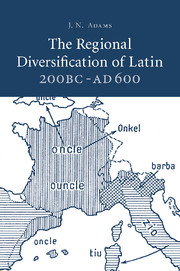Book contents
- Frontmatter
- Contents
- List of maps
- Preface
- List of abbreviations
- Chapter I Introduction
- Chapter II The Republic: inscriptions
- Chapter III Explicit evidence for regional variation: the Republic
- Chapter IV Explicit evidence: the Empire
- Chapter V Regionalisms in provincial texts: Gaul
- Chapter VI Spain
- Chapter VII Italy
- Chapter VIII Africa
- Chapter IX Britain
- Chapter X Inscriptions
- Chapter XI Conclusion
- Maps
- Bibliography
- Index verborum
- Subject index
- Index locorum
Chapter VIII - Africa
Published online by Cambridge University Press: 22 September 2009
- Frontmatter
- Contents
- List of maps
- Preface
- List of abbreviations
- Chapter I Introduction
- Chapter II The Republic: inscriptions
- Chapter III Explicit evidence for regional variation: the Republic
- Chapter IV Explicit evidence: the Empire
- Chapter V Regionalisms in provincial texts: Gaul
- Chapter VI Spain
- Chapter VII Italy
- Chapter VIII Africa
- Chapter IX Britain
- Chapter X Inscriptions
- Chapter XI Conclusion
- Maps
- Bibliography
- Index verborum
- Subject index
- Index locorum
Summary
AFRICITAS
‘African Latin’, often referred to as Africitas and ascribed a component called tumor Africus, has had a bad name since Kroll (1897) delivered his attack on the material adduced by Sittl (1882: 92–143) to demonstrate features of the Latin of the province. Sittl's material is indeed unconvincing, but that does not mean that African Latin was without regional features. We have already seen testimonia which show that in antiquity itself African Latin was perceived as having distinctive characteristics. If one looks beyond the high literary texts discussed by Sittl and others as supposedly exemplifying Africitas to more mundane works such as medical texts and non-literary documents, one finds that it is indeed possible to attribute certain texts to Africa on linguistic grounds, and to identify some of the features of the local Latin. We will see, for example (3.4), that a medical text recently published for the first time (the so-called Galeni liber tertius) can with some confidence be assigned to Africa. Brock, who surpassed Kroll in the detail with which she demonstrated that Sittl's ‘Africanisms’ were nothing of the sort (1911: 186–229), went too far in concluding from her review of the evidence that ‘African Latin was practically free from provincialism’ (1911: 257), a phenomenon which she put down to the spread of education and rhetoric in Africa (257). She also asserted that African Latin ‘was the Latin of an epoch rather than that of a country’ (1911: 260).
- Type
- Chapter
- Information
- The Regional Diversification of Latin 200 BC - AD 600 , pp. 516 - 576Publisher: Cambridge University PressPrint publication year: 2007



